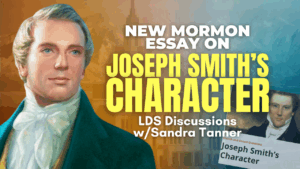Join with us today as we continue to discuss the history of racism in the Mormon church with historian Matt Harris. We will discuss segregation in Utah, including blood banks, hotels, in Relief Societies, etc. In the 1950s a talk was given by Mormon leader Mark E. Petersen that generated a lot of backlash from critics. Matt Harris gives an insider’s view into the minds of these Mormon leaders and how they were not all in agreement with the priesthood and temple ban.
We are thrilled to announce that we have reached our donation goal to compensate Dr. Matt Harris for his contributions to this series. We sincerely thank everyone who supported this effort. While the goal to pay Matt has been met, producing this series incurred significant costs for the Open Stories Foundation. If you find value in this content and want to help cover these expenses and support future productions, we encourage you to donate at mormonstories.org/donate. Your generosity makes a difference—thank you!
Mark E. Peterson’s Talk: Race Problems As They Affect The Church : Internet Archive
Purchase Matt Harris’ book, Second-Class Saints: Black Mormons and the Struggle for Racial Equality




One Response
Mormonism, as practiced by the LDS Church in the 1960s and 1970s, taught me valuable lessons about racism and feminism, even as a Never-Mormon. I loved my Mormon extended family, but I didn’t love or respect them any more or less than my Catholic, Lutheran, or born-again Christian relatives. However, my proximity to their practices and my curiosity about the origins of their faith significantly influenced my opinions about right and wrong during my teenage years. Growing up in Southern California, where my peers and educators valued civil equality and universal human rights, also shaped my perspective.
I admire the scholarship of Dr. Harris and appreciate the 15 years he spent uncovering the evidence he is now presenting.
I can think of no better argument for nontheism, or even anti-theism, than religion itself. The pattern repeats itself throughout recorded history: religion often resists challenges to its assumptions, silences and even kills its heretics, only to eventually accept the truth of their ideas and actions in later generations.
While I strive to accept others with different beliefs and perspectives, there are certain practices I cannot condone. One of these is sending missionaries to spread ideas that are clearly human constructs and can lead to self-loathing and a sense of unworthiness. How dare we approach people of color and teach them a theology that is inherently racist? And how dare we take little girls and teach them they are inferior?
Religions undoubtedly provide moments of joy and transcendence and promote acts of loving kindness. Still, these experiences and behaviors are inherently human and do not depend on the supernatural or a belief in gods and goddesses.
As I listen to Dr. Harris, I can’t help but think about all those precious people who, having been branded and abused by Mormon doctrine, lived with unnecessary trauma inflicted by a relatively tiny group of white men.